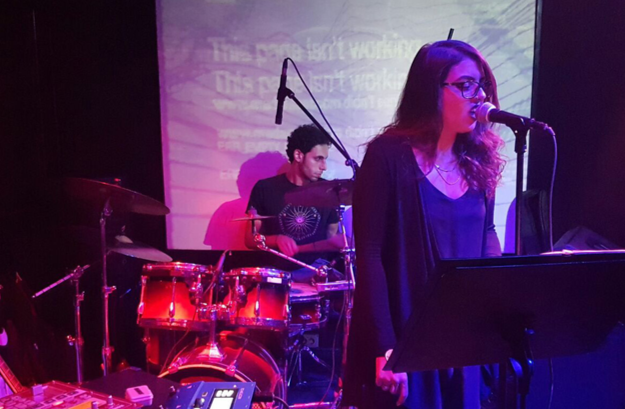By: Ahmed Refai
Follow @ahmedhrefai
As music trumpeted through some dozen speakers scattered across the Cairo Jazz Club, the well-loved spot for many of the city’s art enthusiasts and cultural highbrows, some 300 people were dancing shoulder to shoulder.
Through a haze of cigarette smoke, three musicians grooved to the entrancing synthesizer beats, juxtaposed with eerie, colloquial Arabic vocal lines and ambient pads.
That was the sound of Majhoul (The Unknown), a trio commissioned by Cairo Jazz Club and Egyptian independent online newspaper Mada Masr to produce the second iteration of an event series entitled Found in Translation.
The project is collaborative in its essence; the musicians receive texts written by Mada staff writers, which they then reinterpret as music and lyrics. An artistic metamorphosis, of sorts ensues.
But deep within the artistic concord lies a contrasting political and social message – one of ardent defiance.
In this edition, the texts followed the theme of press freedom, or lack thereof; an issue Mada has had to confront in the past months.
On May 25, Egypt’s Ministry of Interior and communications authorities blocked the Mada website, as part of a widespread cyber-campaign against news outlets.
The government restricted access to these websites based on allegations of receiving funding from the outlawed Muslim Brotherhood, or “supporting terrorism,” as reported by local media.
Nonetheless, the ambience at the Cairo Jazz Club was anything but constrained or censored.
The club swarmed with journalists, such as Maha El Nabawy, one of Mada’s handful of co-founders, who spoke to The Caravan about what it is like to run a censored media outlet amid a growing clampdown on press freedom.
“There is no central theme that we generally choose the texts through,” she said.
“But this time we did choose to frame it through “freedom of speech” and “censorship” as Mada Masr’s website has been blocked by the government, with little to no notice directly from them about the process.”
Mada has continued to publish daily content on Facebook, demonstrably unfazed by — and directly resisting — the censorship.
“This is a complete violation of press freedoms. Alongside continuing to publish about these matters, we thought it important to frame the second iteration of Found in Translation [the collaboration series] of the around those themes,” she said.
The mechanics of this collaborative process – between the editorial staff and the musicians – materialized on stage in a number of ways.
“Mada gave me texts that talked about freedom, political issues and personal struggles, which is very close to the things I write about in the rst place, this is what I do,” Mohamed Ragab, the creative mind behind Majhoul told The Caravan.
Ragab’s personal musical project, Machine Eat Man, has been active in Egypt for more than decade.
Majhoul is not a far departure from Ragab’s signature sound: a brand of electronic music that births industrial synthesizer beats and analog leads with middle eastern elements such as tabla (Middle Eastern percussion) or Arabic style vocals. “Egyptronica,” as he calls it.
“This is my musical direction … I see that there’s a market [for this type of music]. The idea behind writing lyrics in Arabic is reaching a wider audience, making the base bigger.”
“IMAGINE MAKING YOUR OWN DECISIONS; WITH YOUR BACK UNPROTECTED, WITHOUT THE PERSON ON THE SCREENS.”
These were some of the lyrics sung by Malak Salama, Majhoul’s vocalist.
With an adept command of vocal techniques, her voice steered the compositions with a rich, commanding timbre and a range of raspy lows to piercing screams which often resolved into smooth vocalizations.
“All the songs are about a person wanting to be free,” she said. “This is purely political. We interpret the concept of freedom in our own way.”
The event, El Nabawy said, is far from the last artistic endeavor by the publication, which regularly organizes similar underground musical functions around the city. Their monthly playlists at the downtown club ZigZag is one example that has garnered a regular following.
“Music is very important to Mada and our audience, we and it a way that allows for a deeper connection between the publication and the readers — bringing them face to face in several beautiful sounding events,” she said.
It seems that such community engagement is keeping Mada alive, relevant, and moving forward, presumably skipping to the beat of electronic music.
“We will keep publishing nonetheless, on Facebook, organizing events, printing merchandise, making films. The only message is that, we’re still here, hopefully not going anywhere, and might as well incorporate music into the mix because it makes everything a little better.”
